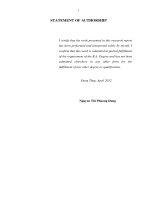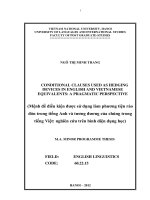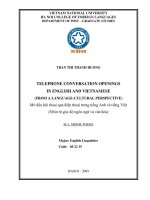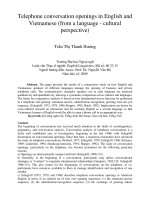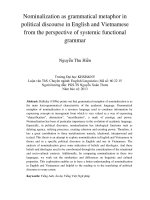Nominalization as grammatical metaphor in political discourse in English and Vietnamese from the perspective of systemic functional grammar
Bạn đang xem bản rút gọn của tài liệu. Xem và tải ngay bản đầy đủ của tài liệu tại đây (539.34 KB, 15 trang )
Nominalization as grammatical metaphor in
political discourse in English and Vietnamese
from the perspective of systemic functional
grammar
Nguyễn Thu Hiền
Trường Đại học KHXH&NV
Luận văn ThS. Chuyên ngành: English Linguistics; Mã số: 60 22 15
Người hướng dẫn: PGS.TS Nguyễn Xuân Thơm
Năm bảo vệ: 2013
Abstract: Halliday (1998a) points out that grammatical metaphor of nominalization is as
the main lexicogrammatical characteristic of the academic language. Grammatical
metaphor of nominalization is a resource language used to condense information by
expressing concepts in incongruent form which is very valued as a way of expressing
“objectification”, abstraction”, “mystification”, a mark of prestige and power.
Nominalization has been of particular importance in the evolution of academic language.
Especially, in political discourse, nominalization has ideological functions such as
deleting agency, reifying processes, creating cohesion and exerting power. Therefore, it
has a great contribution to three metafunctions namely, ideational, interpersonal and
textual. This thesis is an attempt to explore nominalization in English and Vietnamese in
theory and in a specific political discourse in English and one in Vietnamese. The
analysis of nominalization gives some indication of beliefs and ideologies. And these
beliefs and ideologies need to be corroborated through the consideration of the situational
and socio-cultural contexts. Additionally, by comparing nominalization in these two
languages, we work out the similarities and differences on linguistic and cultural
properties. This exploration enables us to have a better understanding of nominalization
in English and Vietnamese and helpful to the reading or to the translating of political
discourse to some extent.
Keywords: Tiếng Anh; Ẩn dụ; Tiếng Việt; Ngữ pháp
iv
TABLE OF CONTENTS
Certificate of originality i
Acknowledgement ii
ABSTRACT iii
TABLE OF CONTENTS iv
LIST OF TABLES vi
PART A: INTRODUCTION 1
1. Justification of the study 1
2. Aims and Objectives of the study 1
3. Scope of the study 2
4. Method of the study 2
5. Format of the study 3
PART B : DEVELOPMENT 4
CHAPTER 1: THEORETICAL BACKGROUND…………………………… ……4
1.1 Systemic Functional Grammar 4
1.2 Grammatical Metaphor 5
1.2.1 What is Grammatical metaphor? 5
1.2.2 Classification of Grammatical Metaphor 6
1.2.2.1 Ideational Metaphors 6
1.2.2.2 Interpersonal Metaphors 7
1.3 The Language of Political Discourse 8
1.3.1 Political Discourse 8
1.3.2 The Language of Politics 8
1.3.3 Language, power and ideology 10
1.4 Some Basic Characteristics of American and Vietnamese Culture 10
1.4.1 American Culture 10
1.4.2 Vietnamese Culture 11
CHAPTER 2: NOMINALIZATION IN ENGLISH AND VIETNAMESE:
A GENERAL DESCRIPTION……………….………………13
2.1 Introduction 13
2.2 Nominalization in English 13
2.2.1 What is Nominalization in English? 13
2.2.2 Categories of Nominalization in English 14
2.2.2.1 Lexical nominalization 14
2.2.2.2 Clausal nominalization 16
2.3 Nominalization in Vietnamese 18
2.3.1 What is Nominalization in Vietnamese? 18
2.3.2 Categories of Nominalization in Vietnamese 18
2.4 Concluding remarks 21
CHAPTER 3: NOMINALIZATION IN POLITICAL DISCOURSES
IN ENGLISH AND VIETNAMESE…….………………………… 21
3.1 Introduction 22
v
3.2 Nominalization in President Bush’s Speech: Address to Congress (September 20
th
,
2001) 22
3.2.1 The Realization of Nominalization 23
3.2.2 Ideational Function 24
3.2.3 Interpersonal Function 27
3.2.4 Textual Function 28
3.3 Nominalization in President Nguyen Minh Triet’s Speech: Diễn Văn Khai Mạc
Đại Lễ 1000 năm Thăng Long (October, 10
th
, 2010) 30
3.3.1 The Realization of Nominalization 31
3.3.2 Ideational Function 31
3.3.3 Interpersonal Function 33
3.3.4 Textual Function 34
3.4 Concluding Remarks 35
CHAPTER 4: FINDINGS AND DISCUSSION:
A CONTRASTIVE COMPARISON…………… ………………… 36
4.1 Introduction 36
4.2 The Similarities and the Differences on Linguistic Properties 36
4.3 The Similarities and the Differences on Cultural Properties 37
PART C : CONCLUSION 40
1. Recapitulation 40
2. Implications 41
3. Limitation and Suggestions for Further Studies 41
REFERENCES 43
1
SUMMARY OF THE THESIS
Halliday (1998a) points out that grammatical metaphor of nominalization is as the main
lexicogrammatical characteristic of the academic language. Grammatical metaphor of
nominalization is a resource language used to condense information by expressing
concepts in incongruent form which is very valued as a way of expressing
“objectification”, abstraction”, “mystification”, “a mark of prestige and power”.
Nominalization has been of particular importance in the evolution of academic language.
Especially, in political discourse, nominalization has ideological functions such as deleting
agency, reifying processes, creating cohesion and exerting power. Therefore, it has a great
contribution to three metafunctions namely, ideational, interpersonal and textual. This
thesis is an attempt to explore nominalization in English and Vietnamese in theory and in a
specific political discourse in English and one in Vietnamese. The analysis of
nominalization gives some indication of beliefs and ideologies. And these beliefs and
ideologies need to be corroborated through the consideration of the situational and socio-
cultural contexts. Additionally, by comparing nominalization in these two languages, we
work out the similarities and differences on linguistic and cultural properties. The
differences outweigh the similarities because English and Vietnamese belong to two
different language families and two different cultures. This exploration enables us to have
a better understanding of nominalization in English and Vietnamese and helpful to the
reading or to the translating of political discourse to some extent.
PART A: INTRODUCTION
1. Justification of the study
Our thesis is entitled “Nominalization as grammatical metaphor in Political Discourse in
English and Vietnamese from the perspective of Systemic Functional Grammar”. The
choice of our thesis is based on three reasons. Firstly, the nominalization, as explained in
later sections, is the nominalizing process, which is “the single most powerful resource for
creating grammatical metaphor” (Halliday: 1994: 352). The absence of sufficient research
on nominalization as grammatical metaphor in political discourse poses an interesting
challenge for us. Secondly, an insight into the nature and the functions of nominalization in
political discourse can help the researcher to make comprehensive and comprehensible
presentations of nominalization and help readers to realize its importance for the
2
comprehension of English and Vietnamese political speeches. Finally, we set out a view of
the interrelationship of language and society, with the emphasis on power and ideology.
Ideology is pervasively present in language, that fact ought to mean that the ideological
nature of language should be one of the major themes of modern social science.
Particularly, there is a close connection between a linguistic choice and a certain ideology
maintained by relations of power, and the power phenomenon is manifested in a variety of
linguistic structures.
2. Aims and Objectives of the study
The aim of this study is to make an inquiry into the nature of nominalization in English and
Vietnamese in general.
This study also points out the functions of nominalization in political discourse and
therefore explains why nominalization should be given special treatment in working with
this specialized genre. Its impacts on the message content are also explored.
In carrying out the study this way, the following questions are raised for exploration.
1. What is the Nature of Nominalization in English and in Vietnamese?
2. What are the Linguistic Structure and the Functions of Nominalization in English
and Vietnamese Political Discourses?
3. What are the Linguistic and Cultural Similarities and Differences between
Nominalization in English political discourse and that in Vietnamese one?
3. Scope of the study
This study attempts to explore the concept of nominalization in English and in Vietnamese
in terms of linguistic structure to find out the similarities and differences of the concept
between the two languages. It is also the intent of this study to analyze the use of
nominalization in political speeches in English and Vietnamese to figure out how it
contributes to the metafunctions of the discourse, the overall meanings of the discourse and
how it serves the speakers‟ ideologies.
4. Methods of the study
We begin this study with a descriptive method to identify the phenomenon, then compare
and contrast the phenomenon between English and Vietnamese. The researcher adopts the
statistical method and analyzes the data in terms of quality and quantity. The study
conducted is an inductive approach where data is collected from English and Vietnamese
political discourses to describe nominalization as a natural linguistics process.
3
In the exploration of nominalization in political discourse, the systemic functional theory
as developed by Halliday (1994), Dik (1997), Matthiessen (1995), and other systemicists is
adopted as the theoretical framework.
5. Format of the study
The paper includes three parts namely Part A- Introduction, Part B- Development and Part
C-Conclusion. Part B is divided into four chapters:
Chapter 1 explores theoretical background of Systemic Functional Grammar, the concept
of Grammatical Metaphor and the Language of Political Discourse.
In chapter 2, the emphasis is on Nominalization in English and Vietnamese as a general
description.
In chapter 3, the focus shifts to Nominalization in political discourse in English and
Vietnamese with a case study on two speeches: one of the President Bush and the other of
the President Nguyen Minh Triet.
Chapter 4 brings focus on a comparative and contrastive analysis between nominalization
in English and Vietnamese to find out both the similarities and the differences. Therefore,
the researcher can suggest some implications for teaching and translating.
PART B : DEVELOPMENT
CHAPTER 1: THEORETICAL BACKGROUND
1.1 Systemic Functional Grammar
Systemic functional linguistics (hereafter abbreviated “SFL”) conceives of text as social
interaction. Systemic functional linguists view language as systems of meaning potential in
human interaction that are realized by various structures. The organizing concept is not a
structure described by rules, but as communicative behavior, as meaning making in a
context of a culture, the behavior matrix within which all social interaction take place and
the general context that gives meaning to culturally recognized activities. In addition,
systemic functional grammar develops a profound analysis of language on the base of
regarding reality- representational and communicative functions of language. These
functions, termed by Halliday as metafunctions including ideational, interpersonal and
textual metafunctions of language, are related to the issue how it is shaped to meet human
needs.
1.2 Grammatical Metaphor
1.2.1 What is Grammatical metaphor?
4
Functional Grammar defines metaphors as variations in the expression of meaning rather
than just variations in the use of words. Functional Grammar looks at metaphors from a
different perspective, not asking “how is this word used?” but “how is this meaning
expressed?” or “how is grammar structured to make the text effective in the achievement
of purpose?” There is a kind of transference going on, the transfer of representation
between different grammatical categories. The difference in the message is the kind of
meaning variation which Halliday (1994) calls Grammatical Metaphor. Therefore,
grammatical metaphor means a substitution of one grammatical class, or one grammatical
structure by another. Similarly, Matthiessen (1995) discusses grammatical metaphor as a
way of expanding the semantic potential of the system; or Thompson (1996) as the
expression of a meaning through a lexical- grammatical form which originally evolved to
express a different kind of meaning.
1.3 The Language of Political Discourse
1.3.1 Political Discourse
Politics is concerned with the power: the power to make decisions, to control resources, to
control other‟s people behavior, and to control their values (Jones, J. & Peccei, J. S., 2004:
36).
1.3.2 The Language of Politics
Politics has its own code, a language variety particular to a specific group. Language is a
means of communication, a means of representing and shaping argument and political
argument is ideological, in that it comes from a series of beliefs.
CHAPTER 2: NOMINALIZATION IN ENGLISH AND VIETNAMESE:
A GENERAL DESCRIPTION
Nominalization is a relatively familiar term in modern linguistics. It can be found occur
frequently in English and Vietnamese. For examples:
(1) FBI agents arrested Bill in New York → the arrest of Bill by FBI agents in New York
(2)Các đặc vụ FBI bắt Bill ở New York → Việc các đặc vụ FBI bắt Bill ở New York
This kind of nominalizing metaphor probably evolved first in scientific and technical
registers, where it played a dual role: first, it made it possible to construct hierarchies of
technical terms, and second, to develop an argument step by step, using complex passages
„packaged‟ in nominal form as Themes. Gradually, it has developed into most other
varieties of adult discourse and becomes “a mark of prestige and power” (Halliday, 1994:
5
353). According to Thomson (1996: 170), nominal groups have two qualities which are
useful. First, a noun typically refers to a „thing‟, i.e. something which exists and the
meaning can now be treated as existing, as a kind of abstract thing. Second, nominalization
is available to function as a participant in another process, and also as Theme.
Furthermore, nominalization is in harmony with ideology of science, and of academic,
formal writing because it allows processes to be objectified, non-finite and unarguable.
This is intimately connected with the fact that it is “thingified‟ by being expressed as a
noun. For reasons mentioned above, in linguistic terms, academic, formal writing shows
preference for noninalization which represents “fossilised” processes whose primary
function is to express not dynamic action but the relationship between the nominals.
We can find out that nominalization in both English and Vietnamese is the process of
forming a new noun or nominal from other parts of speech namely, verbs, adjectives or
even clauses. The nominalized nouns or nominals, which are abstract and stylistic, can
fulfill the functions of nouns such as subject, predicate, complement or adverbial.
However, there are some differences. First, English lexical nominalization can be formed
by adding suffixes like –ant, -er,-or, -ism, ment, -ness, -tion, etc. to the root which can be
an adjective or a verb. On the contrary, Vietnamese lexical nominalization can be created
by the adaptation of such morphemes or nominalizers as cái, nỗi, niềm, sự, việc, cuộc,
điều, điềm, tính, ect. to the front of the word which can be an adjective or a verb. In
addition, a clause in Vietnamese can often be nominalized by adding Sự/ Việc/ Cái to the
verb or adjective + của +complement. Nevertheless, the case which is called converted
nouns in English is the same as the case of turning some verbs into nouns without any
adaptation of any morpheme in Vietnamese. As for clausal nominalization, in English it
occurs not only with finite clauses (that-clauses and wh-clauses) but also with non-finite
clauses (to-infinitive clauses and ing-clauses). Unlike in English, when nominalization
appears at clause level by adding Việc/Điều/Cách to the clause, its structure is “
Việc/Điều/Cách + subject + predicate”.
The following sections will focus on a detailed description of Nominalization in English
and Vietnamese political discourses. Nominalization can be used by politicians as a
powerful device to establish and maintain ideologies; and influence people‟s political and
ideological views.
CHAPTER 3: NOMINALIZATION IN POLITICAL DISCOURSES
6
IN ENGLISH AND VIETNAMESE
3.1 Nominalization in President Bush’s Speech: Address to Congress (September 20
th
,
2001)
On September 11
th
, 2001, two hijacked aircraft crashed into the World Trade Center in
New York City, causing great damage. Another plane hit the Pentagon, headquarters for
the U.S military, outside Washington D.C. A fourth plane, believed to be heading for
Washington D.C., crashed in the rural Pennsylvania when passengers attempted to retake
control from the hijackers. Almost 3,000 people were killed in the attacks. The U.S
government blamed the attacks on terrorists. Speculation centered around the al Qaeda
organization and its leader Osama Bin Laden. Bin Laden was believed to be operating out
of Afghanistan, a nation controlled by the Taliban. As from the very first day of the attacks
on the Twin Towers, on September 20
th
, 2001, President George W. Bush spoke a joint
session of Congress in the U.S Capitol. His speech served many purposes. It stated the
feelings of the nation as well as the government‟s intention to confront and defeat those
that had caused such great damage to the country in an implicit way. It honored those who
had died in the attacks, and those who were struggling to deal with the aftermath. The
president also sought to reassure Americans that they were safe and that steps were being
taken to prevent future attacks. Nevertheless, the central massage of the speech was that
the United States remained strong and unafraid, and that it intended to eliminate terrorist
threats. The President went on to make it clear to the American people and the world that a
protracted struggle against not only al Qaeda, but also world terrorism as whole, was
underway and not only American‟s pursuit, but the world‟s as well. President Bush‟s
speech helped to honor the fallen and reassure the living; however, he did not convince the
Taliban to give in to his commands. The America was, in the end, successful in driving the
Taliban out of power and destroying much of the terrorist‟s infrastructure.
3.2 Nominalization in President Nguyen Minh Triet’s Speech: Diễn Văn Khai Mạc Đại
Lễ 1000 năm Thăng Long (October, 10
th
, 2010)
Draped in red Communist banners and propaganda slogans, Ha Noi, Vietnam‟s capital,
was opening an extravagant ceremony to celebrate its 1000
th
birthday. The ever biggest
national-level event, the most important event in the 10-day program to celebrate the
1000
th
birthday anniversary of Thang Long-Ha Noi, which received UNESCO‟s certificate
to be recognized as a World Cultural Heritage Site, started at 7.30 a.m of October 10
th
at
7
the historical Ba Dinh Square. Party, State and Government leaders, ambassadors,
representatives from international organizations in Vietnam and a large number of
Vietnamese attended the grand millennial anniversary. Ba Dinh square was flooded with
banners and flowers. At 8.00 a.m, State President Nguyễn Minh Triết delivered a speech
praising the proud history of Vietnamese nation and the 1000-year-old capital of Ha Noi. A
millennium ago, in 1010, King Ly Thai To transferred the imperial capital from Hoa Lu to
Thang Long (nowadays Ha Noi), opening a new state for the development of Viet Nam.
Experiencing its 1000 years of ups and downs, Thang Long- Ha Noi is always been united
by patriotism, indomitable spirit, heroism and glorious feats of arms. The capital is the
county‟s heart and the place of convergence of national traditions and values. Thang Long-
Ha Noi is a place that represents the aspiration for peace, friendship and solidarity with all
nations around the world. The capital will continue to develop and flourish in the future,
being a worthy heart and the capital of the Vietnamese nation- the capital of heroism,
peace and friendship. That is the President‟s main ideology, is what he emphasizes to the
listeners. That is not only the President‟s hearted words but also Vietnamese people‟s and
the nation‟s.
3.3 Summary
Nominalization is the main lexicogrammatical characteristic of the language of the two
speeches. It is a resource language used to condense information by expressing concepts in
incongruent forms which are very valued as a way of expressing “objectification”,
abstraction”, “reification”, “a mark of prestige and power”. It is therefore has existential
presupposition and ideological uses because of its potential mystification. It helps conceal
speaker‟s attitude or power relation between the speaker and the hearers. Nominalization in
these two speeches serves as an effective tool to fulfill the two Presidents‟ ideologies.
Therefore, two different pictures have been built up clearly by using the same strategy
namely, nominalization.
CHAPTER 4: FINDINGS AND DISCUSSION:
A CONTRASTIVE COMPARISON
4.1 The Similarities and the Differences on Linguistic Properties
4.1.1 The Similarities
Nominalization in the two languages occurs at both word and clause level. Lexical
nominalization includes de-verbal, de-adjectival and conversion.
8
4.1.2 The Differences
Among lexical nominalizations, those having verbs as roots in English account for 35%
while in Vietnamese only 18.6%. As for the case of conversion, all converted nouns in
English have the same forms with verbs. On the contrary, in Vietnamese, the bases
converted into nouns are mainly adjectives (16 out of 17). The prominent difference is that
many nominal groups in Vietnamese having the structure: nominal prefix + adjective/verb
+ của + complement to express the meaning of possession occupying 30.5%. At clause
level, clausal nominalizations in the English speech are used relatively often (41%). They
include both finite and non-finite clauses. In contrast, in the Vietnamese one there is only
one case. What‟s more, nominalizations in English are used more often than in Vietnamese
(77 and 38 nominalizations per 1000 words respectively). Furthermore, nominalizations
are available to function as participants of other processes and as Theme or Rheme. In
these two speeches, both speakers put nominalization in Rheme position (88% in English
speech and 91.5% in Vietnamese speech) the speakers want to facilitate the expression of
general truths, claims about the nature of world; therefore, they can avoid arguing or
disagreeing. Nominalization of processes also allows the processes to become the Head of
a Nominal Group, or Modifier or Qualifier in a Nominal Group, which can be found in the
English speech.
4.2 The Similarities and the Differences on Cultural Properties
4.2.1 The Similarities
To begin with, both speakers obey the language of politics genre: conciseness, logic,
political terms, persuasiveness, syntactic and rhetoric rules such as repetition, parallelism,
the rule of three, etc. Besides, the speakers have the habit of using a lot of nouns.
4.2.2 The Differences
First of all, there are more nominalizations in English than in Vietnamese. Additionally, we
often find the nominal groups containing the word “của” + complement (possessor) in
Vietnamese. Moreover, in Vietnamese language and culture, subjectiveness is more
prominent while in Anglicist language and culture, objectiveness encroaches.
Regarding the vocabulary used, there is a big difference in word choice which expresses
different cultures and leads to different ideologies conveyed. In the wake of the September
11 attacks, and on the American popular culture: having the virtues of national
independence and economic development, the habits of seeking to remark the region in the
9
US image and pretensions about the universality and superiority of American ideas and
ways of doing things, the Bush administration has been able to advance policies and
invoke solidarities. Such behaviour is quite appropriate with Western culture: ironclad,
hungry for success in dealing with the outside world. On the contrary, in the Vietnamese
speech, nominal groups express Vietnamese culture and ideologies: love-based rule, the
collective thinking way, flexibility, harmonized behaviour and the patriotic doctrine,
consciousness of the national spirit and traditional undauntedness and indomitability.
Furthermore, hidden power always governs the stylistic expressions of American
politicians in general and President Bush in particular. There is always an element of
hidden power in American political speeches because of the American‟s strong
individualism, the psychology of individual-respecting, wanting to be free to make choice,
to pursue their own ideas. Therefore, the speaker‟s political stances are often hidden. On
the contrary, Vietnamese have collective thinking way, which make people aware of the
strength of group, of community and pay attention not to each individual elements
consisted but to the whole reciprocal relations between them. Thus Vietnamese politicians
put aside their individual elements and emphasize the collective elements. That is why the
speaker‟s hidden power on the Vietnamese hearers is not much, and here it is the whole
nation‟s hidden power on the hearers of other nations. Besides, affected by Hồ Chí Minh‟s
style: “writing and speaking is to make others understand precisely” (Ho, C.M., 2002),
Vietnamese political speeches are to make every class of citizens perceive the speakers‟
ideas or ideologies. As a result, the speaker‟s political stances are often clear, logic and
precise.
PART C : CONCLUSION
1. Recapitulation
Let us now briefly summarize the main issues addressed in this thesis. We have begun by
giving an overlook on SFG and Grammatical Metaphor. Then great effort has been put on
describing nominalization- the most powerful resource for creating grammatical metaphor
and can be understood simply as the drift towards “thinginess”-in English and Vietnamese
theoretically. In these two languages, nominalization occurs at the word and clause level.
The functions of nominalization in the discourses which is fully exploited can be summed
up under the labels: deletion, reification, objectification, abstraction, mystification,
10
exertion of power. It is also a device of cohesion and helps the discourses go further step
by step when appearing in Theme or Rheme position or being repeated. Nominalization in
these political discourses severs as an effective tool of expressing the speakers‟ ideologies.
Two distinct ideologies are presented by the use of the same a strategy namely,
nominalization. These different ideologies are controlled by the differences on cultural
properties
2. Implications
To the teachers: A conclusion drawn from this study is that nominalization allows
denseness of information and of meaning.
Thus it should be take into consideration in developing writing material for students.
Additionally, making a comparison between nominalization in English and Vietnamese,
the teachers should work out the similarities and the differences for their students to have a
better understanding about the languages.
To the translators: Therefore, a good knowledge of the functions of nominalization can
help the translators understand the deep structure of discourse or the so-called implicatory
mechanism, then they can pick out the strokes of meaning needed translating.
3. Limitation and Suggestions for Further Studies
On the small scale of our minor thesis, it has been limited to instances of nominalization in
two political speeches: one in English, the other in Vietnamese. Besides, among two types
of grammatical metaphor- ideational and interpersonal, much of our effort has been
focused on the analysis of nominalization- a sub-type of ideational grammatical metaphor.
Therefore, further studies, if possible, should cover a wider range of grammatical metaphor
by paying attention to interpersonal metaphor to have an overall picture of speakers‟
ideologies and presuppositional and implicatory mechanism in political discourse.
Moreover, as the focus of this study is on nominalization in political discourse in English
and in Vietnamese, further research of nominalization in other genres in the two languages
such as journalism or legal would be of great value.
43
REFERENCES
English:
1. Biber D., Conrad S., & Leech G. (2009), Student Grammar of Spoken and Written
English, Hai Phong publisher.
2. Bussmann H., Trauth G., & Kazzazi K. (1996), Routledge Dictionary of Language and
Linguistics, London: Routledge.
3. Dik S.C. (1997), The Theory of Functional Grammar, Berlin New.
4. Douglas L. (2004), “The United States and Middle East Since 1945”, American
Orientalism, University of North Carolina Press, retrieved from
.
5. Fairclough N. (2001), Language and Power, Malaysia, CLP.
6. Fowler R. (1991), Language and Power, London and New York: Longman.
7. Halliday M.A.K (1985), An Introduction to Functional Grammar, London: Edward
Arnold
8. Halliday M.A.K (1994), An Introduction to Functional Grammar. Second Edition.
London: Edward Arnold.
9. Jones J. & Peccei, J. S. (2004), “Language and politics”, in Thomas L.(ed), Language,
Society, and Power, New York: Routledge
10. Kramsch C. (1998a), Language and Culture, Oxford: Oxford University Press.
11. Lev Morev (2005), “Cognitive and Structural Aspects of Abstract Nominalization in
Tai and in Some Other Isolating Languages of East and Southeast Asia”, Hội
thảo ngôn ngữ học liên Á lần thứ VI, Nxb KHXH, Viện KHXH Việt Nam-Viện
ngôn ngữ học.
12. Lock G. (1996), Functional English Grammar: an introduction for second language
teachers, Cambridge, New York.
13. Matthiessen, Christian M.I.M (1995), Lexico-grammatical cartography: English
systems. Tokyo: International Language Sciences Publishers.
14. Melani McA., (2005), “Culture, Media and US Interests in the Middle East Since
1945”, Epic Encounters, retrieved from .
15. Quirk R.et al (1985), A Comprehensive Grammar of English Language, London:
Longman.
44
16. Teun A.van Dijk, “What is Political Discourse Analysis”, Universiteit van Amsterdam,
retrieved from .
17. Thompson G. (1996), Introducing Functional Grammar. London: Edward Arnold.
18. Trần Ngọc Thêm (2008), “Southeast Asian Culture Identity from Typological-
Systemic View”, retrieved from .
Vietnamese:
1. Diệp Quang Ban (2005), Ngữ pháp Tiếng Việt, Nxb GD.
2. Phan Mậu Cảnh (2008), Đặc trưng văn hóa, cội nguồn văn hóa và sự thể hiện chúng
trong ca dao người Việt, retrieved from .
3. Trần Trí Dõi (2001), Ngôn ngữ và sự phát triển văn hóa xã hội, Nxb VHTT.
4. Nguyễn Văn Huệ (2003), Từ điển ngữ pháp Tiếng Việt cơ bản- Dictionary of Basic
Vietnamese grammar: Billingual Vietnamese- English, Nxb ĐHQG.
5. Trần Hữu Mạnh (2005), Ngôn ngữ học đối chiếu cú pháp Tiếng Anh- Tiếng Việt, Nxb
ĐHQG Hà Nội.
6. Hồ Chí Minh tuyển tập 2 (2002), Nxb Chính trị quốc gia.
7. Nguyễn Quang (2002), Một số vấn đề giao tiếp nội văn hóa và giao văn hóa, Nxb
ĐHQG Hà Nội.
8. Nguyễn Kim Thản (2008), Cơ sở ngữ pháp Tiếng Việt, Nxb Khoa học xã hội.
9. Trần Ngọc Thêm (1999), Cơ sở văn hóa Việt Nam, Nxb GD, Hà Nội.
10. Buì Minh Toán (1999), Từ trong hoạt động giao tiếp Tiếng Việt, Nxb GD.
11. Nguyễn Văn Tú (1976), Từ và vốn từ hiện đại, Nxb ĐH và THCN.
12. Cù Đình Tú (2001), Phong cách học và đặc điểm tu từ Tiếng Việt, Nxb GD.
Web site:
1.
anthem.
2. ./Chinh-tri-xa-hoi.

